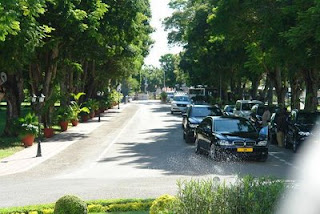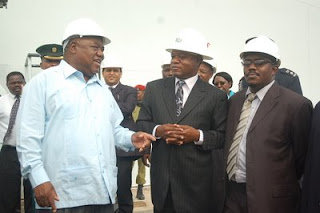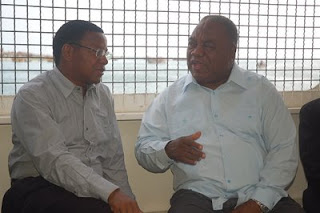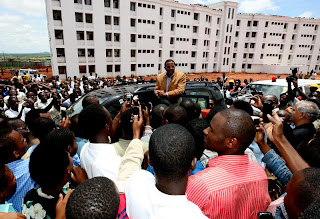
President Hu Jintao arrives in Tanzania tomorrow bearing gifts and offering hope that his country can help the southern African nation weather the global financial crisis.
Hu, currently on a four-nation African tour that includes stops in Mali, Senegal and Mauritius, is scheduled to officially open a Chinese-funded $60 million sports stadium, which seats 60,000, in Dar es Salaam, and break ground on a $25 million conference center named after Tanzania’s first president, Julius Nyerere.
Tanzania is looking to China for help to spur economic growth amid the global crisis. Central Bank Governor Benno Ndulu has said spending cuts may be needed because of pressure on foreign aid, which covered 34 percent of the 7.22 trillion shilling ($5.5 billion) budget this year. China’s trade with Tanzania rose 30 percent in 2007 to $688 million.
“Increasing trade with China provides us a degree of freedom,” Humphrey Moshi, an economics professor at the University of Dar es Salaam, said in an interview yesterday. “It’s come to the time when our budget is difficult to meet, so we can use this chance to see how we can fill in the gaps with Chinese help.”
China’s trade with Africa jumped 10-fold to $106.8 billion last year from just over $10 billion in 2000, according to China’s Ministry of Commerce. Its African investments have focused on oil, such as in Angola, the continent’s top supplier of crude to China, and Sudan, and minerals in Congo and Zambia.
Tazara Railroad
Economic cooperation with Tanzania dates back to the early 1970s when China built the $500 million Tazara railroad that runs 1,860 kilometers (1,162 miles) from Zambia’s northern copper-belt region to the port of Dar es Salaam. Chinese aid also supported a textile factory that helped start a once-thriving industry now under pressure to compete with cheap garment imports from southeast Asia and a growing second-hand clothing market.
“We are very thankful to the Chinese government,” Foreign Minister Bernard Membe told reporters in Dar es Salaam Feb. 9. “It’s a bilateral relationship of two friends since the 1960s.”
China, sixth on the list of foreign investors in Tanzania that is topped by the U.K. and India, made 174 investment deals ranging from telecommunications and tourism to road-building worth $450 million from 1990 to 2006, according to Tanzania’s ministry of industry and trade.
Tanzania may seek Chinese help in rescuing two state-run assets. A Chinese company based in Hong Kong, China Sonangol International, is in talks to acquire a 49 percent stake in debt- saddled national carrier, Air Tanzania, which stopped flying for a month in December, the Deputy Minister of Infrastructure Development, Hezekiah Chibulunje told parliament Feb. 4.
Tanzania and Zambia are considering a proposal to privatize the Tazara railway, and if they agree on it, Chinese investors will be the preferred bidder, Tazara’s Acting Deputy Managing Director, Damas Ndumbaro, said in an interview in Dar es Salaam on Feb. 10.
“We are giving priority to the Chinese because they made the sacrifices,” he said.
For Tanzania, trade with China remains unbalanced, Moshi said. Its main exports to China include dry seafood, raw leather, logs, coarse copper and wooden handcrafts, according to the Web site of China’s foreign ministry.
“We are sending raw materials to China, not value added goods,” Moshi said.
Timber
China is a top importer of Tanzania’s timber, a state- regulated trade plagued by corruption, poor management, and illegal logging, Traffic, a Cambridge, U.K.-based conservation group, said in a May 2007 report. China imported 10 times more timber than Tanzania’s export records document over the 2004-2005 period, suggesting a 90 percent loss of revenue, the report said.
Roughly 20 percent of merchandise circulating in Tanzania is counterfeit or pirated, with many of these goods such as clothes, mobile phones and spare car parts manufactured in China, according to an April 2008 study by the Confederation of Tanzania Industries.
Efforts to bring Chinese investors into Tanzania’s western Kigoma region were frustrated by differences in language and the vast geographical distance, Joseph Simbakalia, the regional commissioner, said on Feb. 10.
“We need better cultural familiarity with China, like we share with our traditional trade partners in Europe and the United States,” Simbakalia said in an interview from the regional capital, Dodoma.
MsomajiDar es salaam


































 Chinese President Hu Jintao (R, front) is greeted upon his arrival at the airport in Dar es Salaam, Tanzania, Feb. 14, 2009. Hu arrived here on Saturday night for a state visit to Tanzania.
Chinese President Hu Jintao (R, front) is greeted upon his arrival at the airport in Dar es Salaam, Tanzania, Feb. 14, 2009. Hu arrived here on Saturday night for a state visit to Tanzania. 
 President Hu Jintao arrives in Tanzania tomorrow bearing gifts and offering hope that his country can help the southern African nation weather the global financial crisis.
President Hu Jintao arrives in Tanzania tomorrow bearing gifts and offering hope that his country can help the southern African nation weather the global financial crisis.













